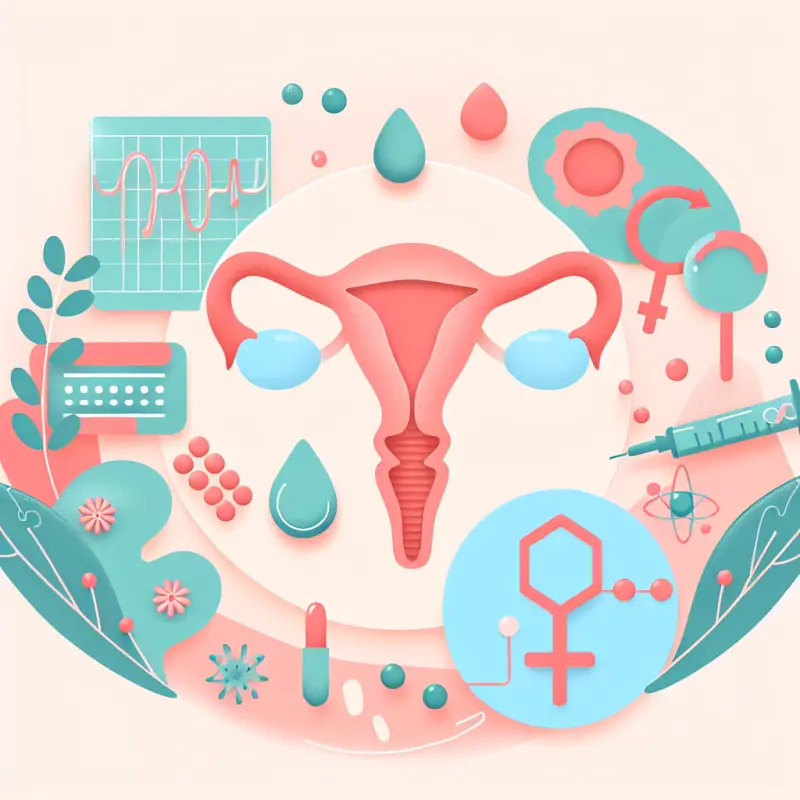Prolactin Disorders: How High Levels Affect Your Period

Prolactin Disorders: How High Levels Affect Your Period
Introduction
Hormonal balance plays a crucial role in the regulation of various physiological processes, and any disruption can lead to significant health issues. Among the key hormones involved in reproductive health is prolactin, a hormone produced by the pituitary gland. While prolactin is primarily known for its role in lactation, its influence extends beyond breastfeeding mothers. Elevated prolactin levels, a condition known as hyperprolactinemia, can have profound effects on menstrual health. In this article, we will delve into the intricacies of prolactin disorders, focusing on how high levels of this hormone can affect menstruation.
Understanding Prolactin
What is Prolactin?
Prolactin is a peptide hormone primarily produced by the anterior pituitary gland. It is best known for its role in enabling mammals, including humans, to produce milk. However, prolactin has over 300 functions in the body, ranging from reproductive to metabolic, and even immune system modulation.
Functions of Prolactin
- Lactation: Stimulates milk production in postpartum females.
- Reproductive Health: Influences ovarian follicle maturation and luteal function.
- Metabolism: Plays a role in regulating insulin and glucose metabolism.
- Immune System: Modulates immune response and can have immunostimulatory or immunosuppressive effects.
Hyperprolactinemia: Elevated Prolactin Levels
Causes of Hyperprolactinemia
Hyperprolactinemia occurs when there is an excess of prolactin in the blood. Several factors can contribute to elevated prolactin levels:
- Pituitary Tumors: Prolactinomas, benign tumors of the pituitary gland, are the most common cause.
- Medications: Certain medications, such as antipsychotics and antiemetics, can increase prolactin levels.
- Hypothyroidism: Underactive thyroid can lead to increased prolactin secretion.
- Stress: Physical or emotional stress can elevate prolactin levels temporarily.
- Other Medical Conditions: Chronic liver or kidney disease, and polycystic ovary syndrome (PCOS).
Symptoms of Hyperprolactinemia
The symptoms of elevated prolactin levels can vary depending on the underlying cause and the individual. Common symptoms include:
- Menstrual Irregularities: Irregular or absent periods (amenorrhea).
- Galactorrhea: Unintended milk production unrelated to childbirth or nursing.
- Infertility: Difficulty conceiving due to disrupted ovulation.
- Sexual Dysfunction: Reduced libido and vaginal dryness.
- Vision Problems and Headaches: Can occur if a pituitary tumor is present.
How High Prolactin Levels Affect Your Period
Menstrual Cycle Overview
The menstrual cycle is a complex interplay of hormones that prepare the female body for potential pregnancy. It involves the hypothalamus, pituitary gland, ovaries, and uterus. The cycle is divided into several phases:
- Menstrual Phase: Shedding of the uterine lining.
- Follicular Phase: Follicle development and estrogen production.
- Ovulation: Release of an egg from the ovary.
- Luteal Phase: Corpus luteum formation and progesterone production.
Impact of Prolactin on Menstrual Cycle
High prolactin levels can interfere with the hormonal signals that regulate the menstrual cycle:
- Inhibition of Gonadotropin-Releasing Hormone (GnRH): Elevated prolactin suppresses GnRH, reducing luteinizing hormone (LH) and follicle-stimulating hormone (FSH) secretion.
- Disrupted Ovulation: Reduced LH and FSH levels lead to anovulation, where ovulation does not occur, causing irregular or absent periods.
- Luteal Phase Defects: Even if ovulation occurs, elevated prolactin can impair corpus luteum function, leading to inadequate progesterone production.
Common Menstrual Irregularities
Women with hyperprolactinemia may experience a range of menstrual irregularities:
- Amenorrhea: Absence of menstruation for several months.
- Oligomenorrhea: Infrequent menstrual periods.
- Menorrhagia: Heavy menstrual bleeding.
- Shortened Luteal Phase: Reduced period between ovulation and menstruation.
Diagnosis of Hyperprolactinemia
Medical History and Physical Examination
A thorough medical history and physical examination are essential for diagnosing hyperprolactinemia. The physician will inquire about:
- Menstrual cycle patterns.
- Presence of galactorrhea.
- Medication use.
- Symptoms of hypothyroidism.
Laboratory Tests
Blood tests are conducted to measure prolactin levels and rule out other conditions:
- Serum Prolactin Test: Measures prolactin concentration in the blood.
- Thyroid Function Tests: Assess thyroid hormone levels.
- Pregnancy Test: To exclude pregnancy as a cause of amenorrhea.
Imaging Studies
If a prolactinoma is suspected, imaging studies may be performed:
- Magnetic Resonance Imaging (MRI): Provides detailed images of the pituitary gland to detect tumors.
- Computed Tomography (CT) Scan: An alternative if MRI is unavailable.
Treatment Options for Hyperprolactinemia
Medications
The primary treatment for hyperprolactinemia involves medication to lower prolactin levels:
- Dopamine Agonists: Drugs like cabergoline and bromocriptine are commonly prescribed. They mimic dopamine, inhibiting prolactin secretion.
- Thyroid Hormone Replacement: Used if hypothyroidism is the underlying cause.
Surgery
Surgical intervention may be necessary if medication is ineffective or if a large pituitary tumor is present:
- Transsphenoidal Surgery: A minimally invasive procedure to remove pituitary tumors.
Radiation Therapy
Radiation therapy is a rare option, used if other treatments are unsuccessful:
- Stereotactic Radiosurgery: Targets tumor cells with focused radiation.
Lifestyle and Natural Remedies
Stress Management
Chronic stress can exacerbate hyperprolactinemia. Techniques to manage stress include:
- Mindfulness and Meditation: Practices that promote relaxation.
- Yoga and Exercise: Physical activities that reduce stress hormones.
Diet and Nutrition
A balanced diet can support hormonal health:
- Avoid Processed Foods: Reduce intake of sugar and refined carbohydrates.
- Increase Fiber Intake: Helps regulate blood sugar and insulin levels.
- Consume Omega-3 Fatty Acids: Found in fish and flaxseeds, supports hormonal balance.
Herbal Supplements
Some herbal supplements may help manage prolactin levels, though scientific evidence is limited:
- Vitex (Chasteberry): Traditionally used to balance hormones and support menstrual health.
- Maca Root: Believed to enhance fertility and hormonal balance.
Conclusion
Prolactin disorders, particularly hyperprolactinemia, can significantly impact menstrual health and overall well-being. Understanding the role of prolactin and the potential causes and effects of its dysregulation is crucial for diagnosis and treatment. Fortunately, with appropriate medical intervention and lifestyle modifications, individuals affected by high prolactin levels can achieve hormonal balance and improve their menstrual health. If you suspect you are experiencing symptoms of hyperprolactinemia, it is essential to consult a healthcare professional for proper evaluation and management. By addressing prolactin disorders, women can reclaim control over their reproductive health and enhance their quality of life.